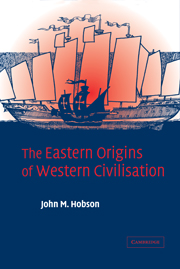Book contents
- Frontmatter
- Contents
- List of tables
- Preface and acknowledgements
- Map: Hobo-Dyer projection of the world
- 1 Countering the Eurocentric myth of the pristine West: discovering the oriental West
- I The East as an early developer: the East discovers and leads the world through oriental globalisation, 500–1800
- II The West was last: oriental globalisation and the invention of Christendom, 500–1498
- III The West as a late developer and the advantages of backwardness: oriental globalisation and the reconstruction of Western Europe as the advanced West, 1492–1850
- 8 The myth of 1492 and the impossibility of America: the Afro-Asian contribution to the catch up of the West, 1492–c. 1700
- 9 The Chinese origins of British industrialisation: Britain as a derivative late developer, 1700–1846
- 10 Constructing European racist identity and the invention of the world, 1700–1850: the imperial civilising mission as a moral vocation
- 11 The dark side of British industrialisation and the myth of laissez-faire: war, racist imperialism and the Afro-Asian origins of industrialisation
- IV Conclusion: the oriental West versus the Eurocentric myth of the West
- Notes
- Index
10 - Constructing European racist identity and the invention of the world, 1700–1850: the imperial civilising mission as a moral vocation
Published online by Cambridge University Press: 22 September 2009
- Frontmatter
- Contents
- List of tables
- Preface and acknowledgements
- Map: Hobo-Dyer projection of the world
- 1 Countering the Eurocentric myth of the pristine West: discovering the oriental West
- I The East as an early developer: the East discovers and leads the world through oriental globalisation, 500–1800
- II The West was last: oriental globalisation and the invention of Christendom, 500–1498
- III The West as a late developer and the advantages of backwardness: oriental globalisation and the reconstruction of Western Europe as the advanced West, 1492–1850
- 8 The myth of 1492 and the impossibility of America: the Afro-Asian contribution to the catch up of the West, 1492–c. 1700
- 9 The Chinese origins of British industrialisation: Britain as a derivative late developer, 1700–1846
- 10 Constructing European racist identity and the invention of the world, 1700–1850: the imperial civilising mission as a moral vocation
- 11 The dark side of British industrialisation and the myth of laissez-faire: war, racist imperialism and the Afro-Asian origins of industrialisation
- IV Conclusion: the oriental West versus the Eurocentric myth of the West
- Notes
- Index
Summary
Turkey, China and the rest would some day be prosperous. But those people will never begin to advance … until they enjoy the rights of man; and these they will never obtain except by means of European conquest.
Winwood ReadeIt has been said that our civilizing mission alone can justify our occupation of the lands of uncivilized peoples. All our writings, lectures and broadcasts repeat ad nauseam our wish to civilize the African [and Eastern] peoples. No doubt there are people who delight to regard as the progress of civilization the amelioration of material conditions, increase of professional skill, improvements in housing, in hygiene and in scholastic instruction. These are, no doubt, useful and even necessary ‘values’. But do they constitute ‘civilization’? Is not civilization, above all else, progress in human personality?
Father PlacideThis chapter serves three main purposes. First, it advances my claim that identity formation played an important part in the rise of the West. It does this by showing that identity formation was an important factor that led on to imperialism, which in turn enabled the later phase of the rise of the West (see ch. 11). Second, it was the invention of a racist identity that lay at base of the imperial discourse. This enables me to counter the general Eurocentric assumption that progressive liberal properties underpinned the rise of the West. And third, it reinforces my general claim that the global context was vital to the rise of the West.
- Type
- Chapter
- Information
- The Eastern Origins of Western Civilisation , pp. 219 - 242Publisher: Cambridge University PressPrint publication year: 2004



